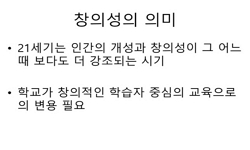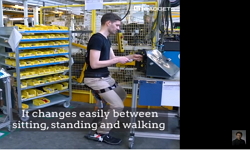최근 교육부는 디지털 인재 양성에 가중치를 두기시작하였다. 이에 대학 교양 수업에서도 디지털 도구를 활용하여 학습자에게 어떻게 융합적으로 접목시킬수 있을지에 대한 교수자들의 고...
http://chineseinput.net/에서 pinyin(병음)방식으로 중국어를 변환할 수 있습니다.
변환된 중국어를 복사하여 사용하시면 됩니다.
- 中文 을 입력하시려면 zhongwen을 입력하시고 space를누르시면됩니다.
- 北京 을 입력하시려면 beijing을 입력하시고 space를 누르시면 됩니다.

대학생의 디지털 스토리텔링 활동이 학습자의 자기존중감, 창의성에 미치는 효과와 자기존중감과 창의성의 관계 분석 = The Effects of College Students' Digital Storytelling Activities on Learner's Self-Esteem and Creativity, and an Analysis of the Relationship between Self-Esteem and Creativity.
한글로보기부가정보
국문 초록 (Abstract)
최근 교육부는 디지털 인재 양성에 가중치를 두기시작하였다. 이에 대학 교양 수업에서도 디지털 도구를 활용하여 학습자에게 어떻게 융합적으로 접목시킬수 있을지에 대한 교수자들의 고민이 커지고 있다. 현재 재학 중인 학생들은 디지털과 친근한 디지털 네이티브(digital natives)세대로 표현되지만, 입시 스트레스를 겪은 세대로 대학 진학과 동시에 진로와 취업, 경제적 문제 등의 고민을 안고 살아가는 세대이다. 이는 자기존중감에 부정적인 영향을 미치고 부정적인자기 인식은 창의성에도 영향을 미치게 된다. 모든 것이 빠르게 변화하고 있는 빅블러(Big Blur)의 시대 환경에 적응할 수 있도록 돕는 창의성은 매우 중요한요소이다. 따라서 선행연구에서도 언급한 창의력에 영향을 주는 학습자들의 자기존중감의 관계 분석이 디지털 스토리텔링 활동에서는 어떻게 결과가 나타나는지에 대해 상관관계를 분석해 보고자 한다. 디지털 스토리텔링을 통한 디지털 융합 교육이 자기존중감과 창의성 두 변인에 긍정적인 영향을 줄 수 있는가에 대한교육적 발견은 더욱 가치가 있을 것으로 여겨진다.
본 연구의 목적은 자신들의 경험과 스토리를 엮어서 디지털 도구를 활용하여 교훈적인 요소를 포함한자기 생각과 자기표현을 하는 디지털 스토리텔링 활동이 대학생의 자기존중감과 창의성에 긍정적인 영향을 미치는지, 또한 자기존중감과 창의성과의 연관성은어떠한지, 자기존중감이 높을수록 창의성에 긍정적인영향을 미치는지에 대해 연구하는 것이다. 본 논문의구성은 디지털 스토리텔링 활동의 교육적 특징, 자기존중감과 디지털 스토리텔링 활동의 연관성, 창의성과디지털 스토리텔링 활동의 연관성, 자기존중감과 창의성의 관계에 대해 논하였고 분석 과정을 통해서 변인간 미치는 영향을 분석하였다. 연구 대상은 서울 수도권 C 대학의 필수 핵심 교양수업을 한 학기 동안 수강한 82명의 학습자이다. 연구 방법으로는 수업 전과수업 후 설문지를 통해서 진행되었으며, 분석은 SPSS 25.0으로 진행하였다. 자기존중감과 창의성의 사전-사후 검사는 대응 표본 t 검정으로 분석하였으며, 자기존중감과 창의성의 관계는 상관관계분석, 자기존중감이 창의성에 주는 영향은 단순 회귀분석을 활용하였다. 그 결과는 다음과 같다.
첫째, 대응 표본 t-검정 결과 대학생의 디지털 스토리텔링 활동이 자기존중감, 창의성에 미치는 영향은모두 사전보다 사후 결과에서 유의미하게 향상되었음을 확인할 수 있었다.
둘째, 상관관계 분석 결과 대학생의 디지털 스토리텔링 활동에서 창의성과 자기존중감의 관계는 유의한 정적(+) 상관관계를 보였다. 수업 전의 자기존중감과 창의성의 상관관계에서는 부(-)적 상관관계를 보였는데, 수업후의 자기존중감과 창의성의 상관관계에서는 정(+)적 상관관계를 보이는 것으로 나타났다. 이는 본 디지털 스토리텔링 수업이 자기존중감과 창의성에 모두 영향을미친 것을 확증할 수 있는 것으로 해석될 수 있다.
셋째, 단순 회귀분석 결과 대학생의 디지털 스토리텔링 활동에서 자기존중감은 창의성에 유의한 정(+) 의 영향을 미치는 것으로 나타났으며 자기존중감이높아질수록 창의성이 높아지는 것으로 평가되었다.
따라서 본 연구는 디지털 도구를 활용한 디지털 스토리텔링 활동이 학습자의 자기존중감, 창의성에 미치는 긍정적인 효과를 도출하였고, 디지털 스토리텔링수업 후 자 ...
다국어 초록 (Multilingual Abstract)
The recent emphasis by the Ministry of Education on cultivating digital talent has prompted a shift in focus. Consequently, educators are increasingly contemplating how to integratively incorporate digital tools into university general education cours...
The recent emphasis by the Ministry of Education on cultivating digital talent has prompted a shift in focus. Consequently, educators are increasingly contemplating how to integratively incorporate digital tools into university general education courses. While current students are often characterized as digital natives, they face the challenges of navigating not only university education but also career choices, employment, and economic concerns amid the stress of the competitive entrance exam generation. This can negatively impact their self-esteem, influencing creativity adversely. Adaptability to the rapidly changing environment of the Big Blur era becomes crucial for these students.
Therefore, investigating the correlation between learners' self-esteem, as discussed in previous studies, and creativity in the context of digital storytelling activities is essential. Educational discoveries regarding the positive impact of digital storytelling activities on self-esteem and creativity among university students would be highly valuable. This paper aims to explore whether engaging in digital storytelling activities, where students intertwine their experiences and stories to express their thoughts and ideas using digital tools, positively influences self-esteem and creativity.
Additionally, the study seeks to understand the relationship between self-esteem and creativity and whether higher self-esteem correlates with a positive impact on creativity.
The structure of this paper involves discussions on the educational characteristics of digital storytelling activities, the correlation between self-esteem and digital storytelling activities, the correlation between creativity and digital storytelling activities, and the relationship between self-esteem and creativity. Through the analysis process, the paper examines the influence of variables on each other. The study involved 82 learners who took a core mandatory general education course at a university in the Seoul metropolitan area for one semester. The research utilized pre-and post-course surveys, and the analysis was conducted using SPSS 25.0. Pre-post comparisons of self-esteem and creativity were analyzed using paired-sample t-tests. The relationship between self-esteem and creativity was analyzed using correlation analysis, and the impact of self-esteem on creativity was assessed through simple regression analysis. The results are as follows: Firstly, the paired-sample t-test results confirm a significant improvement in self-esteem and creativity among university students after engaging in digital storytelling activities, compared to the pre-course results.
Secondly, correlation analysis indicates a significant positive correlation between creativity and self-esteem in university students participating in digital storytelling activities. While a negative correlation was observed between self-esteem and creativity before the course, a positive correlation emerged after the course, suggesting that the - 54 - digital storytelling class positively influenced both self-esteem and creativity. Thirdly, simple regression analysis reveals a significant positive impact of self-esteem on creativity in university students engaged in digital storytelling activities.
Higher self-esteem is associated with higher creativity.
Therefore, this study demonstrates that digital storytelling activities utilizing digital tools have a positive effect on learners' self-esteem and creativity. The analysis of the relationship between self-esteem and creativity after the digital storytelling course reveals a positive correlation.
These findings suggest the potential of digital storytelling activities, employing digital tools, to foster self-esteem and creativity in learners. This study aims to contribute meaningful insights for the future utilization and application of digital storytelling education.
동일학술지(권/호) 다른 논문
-
- 한국전시산업융합연구원
- 최주현
- 2023
- KCI등재
-
어린이 문화유산교육을 위한 영국문화유산 공간 활용 연구
- 한국전시산업융합연구원
- 소미
- 2023
- KCI등재
-
- 한국전시산업융합연구원
- 장배경
- 2023
- KCI등재
-
- 한국전시산업융합연구원
- 이소예
- 2023
- KCI등재




 DBpia
DBpia






